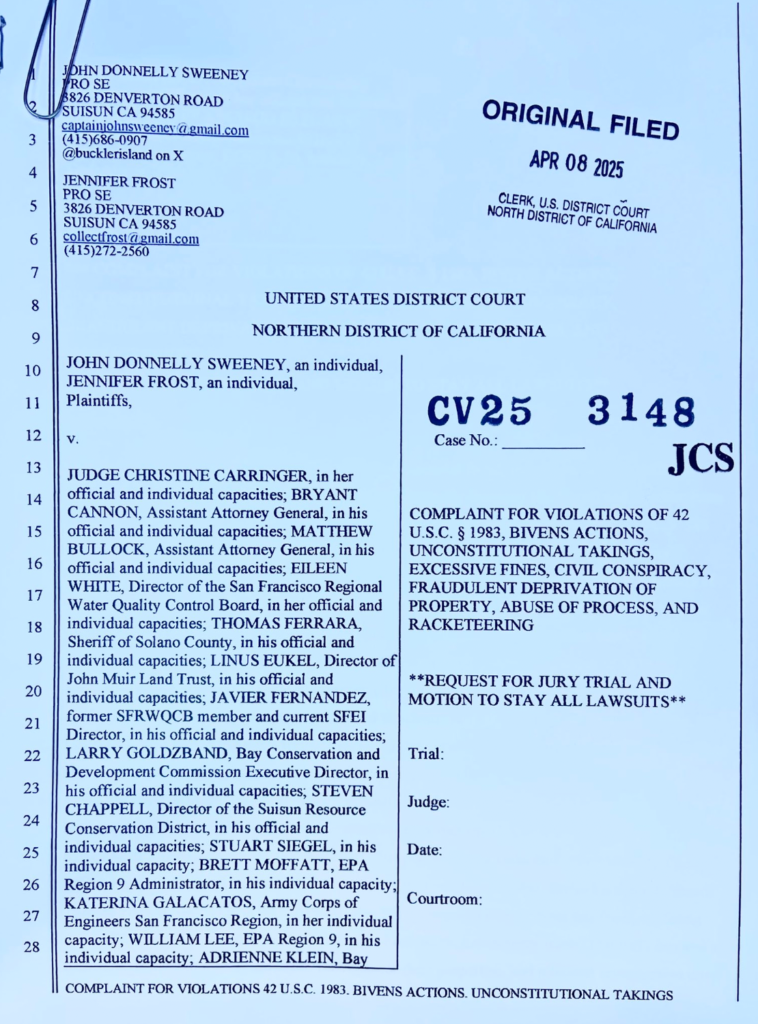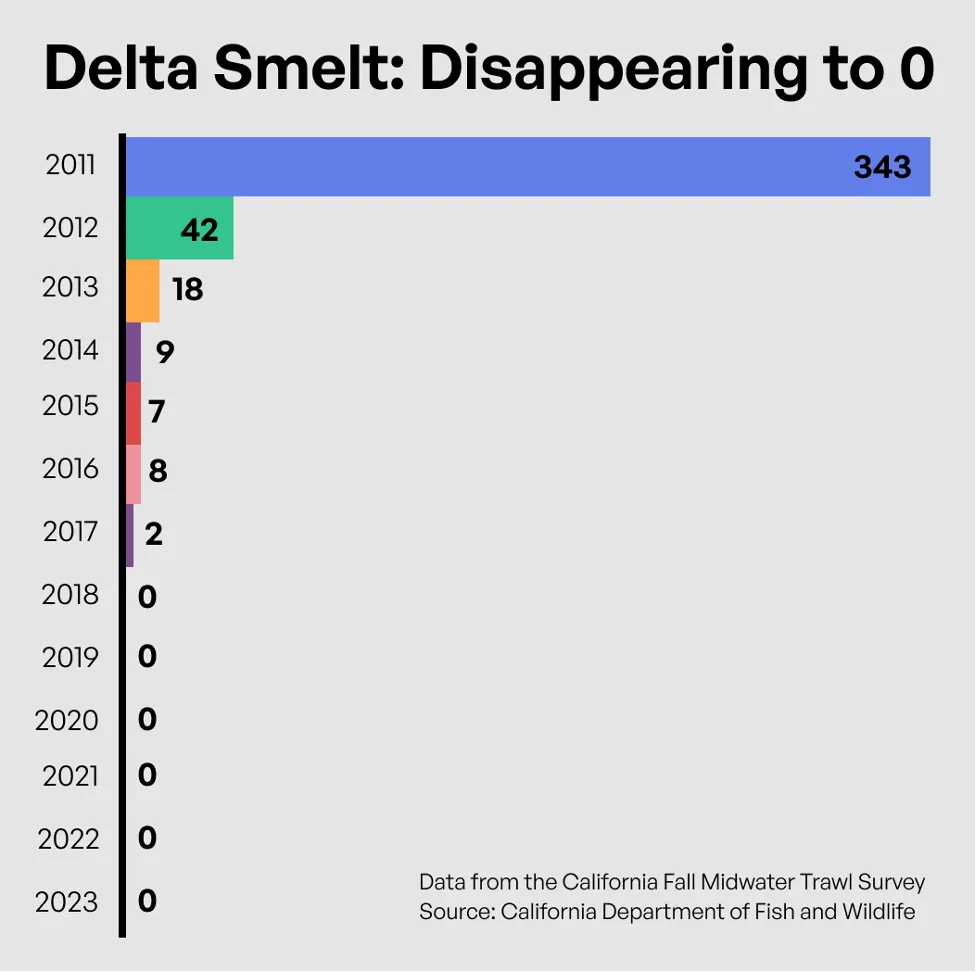First AI-Powered Lawsuit Exposes California’s Eco-Fraud Empire
John Sweeney’s Historic Filing Unleashes a $665M Fight Against a 25-Year Conspiracy
On April 8, 2025, John Donnelly Sweeney and Jennifer Frost, a couple cornered by a decade of eco-tyranny and denied legal counsel, filed a 34-page federal lawsuit—possibly the first AI-drafted civil rights and RICO case in U.S. history. Their weapon? xAI’s Grok.

This isn’t just a legal salvo; it’s a $665 million reckoning aimed at California’s environmental fraud machine. It alleges a 25-year conspiracy that stole $152 million in property and nearly erased the Delta Smelt.
“We had no lawyers, so we taught AI to litigate—our records, our story, the truth,” Sweeney told The Daily Muck. With Grok as their lead counsel, they’ve ignited a battle that could redefine justice.
Welcome to the fourth chapter of our investigative series, where technology clashes with treachery, and the stench of wetland restoration fraud rises from the muck.
The AI Arsenal: How Sweeney Turned Desperation into a Legal Juggernaut
John Sweeney and Jennifer Frost didn’t seek this fight, it hunted them down. Since August 2022, Solano County Judge Christine Carringer and Regional Water Board official Eileen White allegedly blocked them from hiring lawyers, a move their filing brands as a due process gut-punch.
When Sweeney filed for bankruptcy in 2023, White sued his attorney, forcing the lawyer to abandon him and repay $20,000 to the Water Board. “We were trapped,” Sweeney says, his voice rough with exhaustion. With no legal lifeline, they turned to an unlikely ally: xAI’s Grok.
For four months, Sweeney and Frost fed Grok and OpenAI’s ChatGPT a war chest of data—7,000 court documents, federal RICO manuals, Ninth Circuit guidelines, and a decade of battle scars. Grok outshone its rival, recalling thousands of pages with precision while ChatGPT honed the legal edge. Together, they crafted a 34-page beast—11 counts of racketeering and civil rights violations under 42 U.S.C. § 1983, citing cases like Dennis v. Sparks. The filing demands $165 million in damages and a federal probe into falsified fish habitats. “Grok turned our desperation into a weapon,” Sweeney says. “I’ve spent ten years in court—I know as much as any law grad.”
This isn’t just their salvation—it’s a potential revolution. As elite firms tinker with AI research, Sweeney made Grok his lead counsel, leveling the field for pro se litigants crushed by the system. “They tried to silence us,” he growls. “AI gave us a megaphone.” If this filing holds, it could rewrite how ordinary people fight back.
The Fraud Empire: 25 Years of Lies and Looted Ecosystems
Beneath the AI fireworks lies a festering scandal: a 25-year eco-fraud scheme that’s gutted California’s wetlands and fleeced taxpayers dry.
Sweeney’s filing pins the start in 1999 when the San Francisco Estuary Institute (SFEI) allegedly rigged the EcoAtlas database with wetland projects that never existed. Years later this database was used by SFEI to populate the newly developed site EcoAtlas, an EPA funded project that became the key platform for tracking California’s wetland restoration. But Sweeney alleges that figures like environmental scientist Stuart Siegel and Steve Chappell of the Suisun Resource Conservation District have doctored it, logging private islands like Sweeney’s Point Buckler and Chipps as finished fish habitats, while work was never done and permits never filed. This lie, he claims, raked in millions from the EPA, NOAA, and Calfed among others, for ghost projects, accelerating the Delta Smelt’s near extinction, a casualty of greed cloaked as conservation.

By 2003, SFEI boasted 2,500 restored acres in Suisun Marsh. The truth? Just 70 acres existed, limping to completion at Blacklock by 2007. The filing ties this sham to the Delta Smelt’s collapse—a species traded for grift dressed up as green. Sweeney’s 2015 Public Records Act request pried loose 5,000 emails exposing the hustle—NOAA and Water Board officials scrambling to justify unpermitted “projects.” The response? Not fixes, but $41 million in fines and lawsuits to bury him, a retaliation blitz the filing dubs a “civil conspiracy” under 42 U.S.C. § 1983. “This isn’t incompetence,” Sweeney says, his voice cutting. “It’s a heist—and I was their mark.”
The Land Heist: $152 Million Ripped Away in Plain Sight
The fraud didn’t just kill fish—it crushed Sweeney and Frost. Their filing lays out a ruthless land grab: Point Buckler Island, valued at $40 million, was unloaded at a sham sheriff’s sale on January 22, 2025, for $3.78 million—pocket change on an expired writ. Chipps Island, worth $125 million, was forced into a 2017 sale for $8.6 million. Total hit: $152 million gone. Their kiteboarding and mitigation business gutted. Their lives shattered.
It gets uglier. According to the lawsuit, Judge Christine Carringer voided a $3.2 million community property deed without a hearing, a potential Fifth Amendment takings violation. Sheriff Thomas Ferrara went through with the Point Buckler sale despite the alleged legal rot, a Fourth Amendment overreach. Sweeney even offered Point Buckler for real restoration—an olive branch the EPA swatted away, pushing a trial that bankrupted him by 2023.
“They didn’t want wetlands fixed—they wanted me broken,” Sweeney says, his tone forged in fury. News clips caught the chaos—arrests of Sweeney and his wife at the auction, aired coast-to-coast. This wasn’t a sale; it was eco-extortion, with taxpayers left holding the bag.
The Judicial Betrayal: Courts as Enforcers of the Fraud
Sweeney’s filing doesn’t spare the courts—they’re not just bystanders; they’re the muscle. It suggests that Judge Christine Carringer’s 2022 order barring Sweeney from hiring counsel wasn’t a fluke—it was a chokehold. “If this is criminal and I’m going to jail, I want a lawyer,” he pleaded in a hearing. “Denied,” came the reply (Solano Superior Court transcript). Another ruling froze his assets: “You aren’t paying attorneys. You aren’t selling anything” (transcript). She greenlit the sham Point Buckler sale, issued defective warrants, and oversaw his 36-hour detention in 2023—all without counsel. Even Frost, uninvolved in prior suits, got the same gag.

Carringer’s rap sheet raises eyebrows. Bounced from family court in 2017 after a recall push over DUIs and shaky rulings, she stumbled into civil cases with no chops, Sweeney claims: “She didn’t know jail orders required public defenders.” The filing says she’s lost judicial immunity. Appellate Justice Peter Siggins flipped three 2017 wins for Sweeney in 2021—a 1% odds anomaly. Federal Judge Kimberly Mueller reopened United States v. Sweeney in 2020, hitting him with a multi-million-dollar restoration order in 2025, a lifeline for agency budgets.
The cost of this crusade? Sweeney estimates the state and feds burned through $30 million in taxpayer funds on lawsuits that lasted over a decade to seize 30 acres of fish habitat—$3 million an acre. “The courts weren’t blind—they were bought,” Sweeney snarls. If true, this is a judicial hit squad propping up a racketeering empire—and the eco-fraud gravy train rolls on.
A Reckoning Looms
Sweeney’s Grok-forged filing isn’t just a lawsuit—it’s a sledgehammer. It demands $665 million—$165 million for stolen property, $500 million for a decade of torment—plus the return of Point Buckler and Chipps Islands and a federal probe into fake fish habitats statewide. Filed on April 8, 2025, and awaiting a Northern District judge, this case could torch a spotlight on California’s eco-fraud rot—and spark an AI justice revolution.
A 2024 debt suit marked the first AI-drafted federal case, but Sweeney’s RICO and civil rights salvo might be the first of its kind, arming pro se fighters against a rigged system. “We have nothing left to lose,” he says, Grok rating their odds above big-firm filings. “The truth doesn’t need a lawyer—just a pulse.”
If it sticks, it’s a lifeline; if AI misfires, it’s a lesson. Either way, it’s a flare for every citizen burned by the public system. Will the courts rise or sink deeper? Sweeney’s megaphone is blaring—the fraud lords can’t hide now.
Dig Deeper into the Series: Catch up on our eco-fraud saga with,
Fake Restorations Killed California’s Delta Smelt
Wetlands and Wetland Restoration in California
More muck to come.
Discover More Muck
Former Child Soldier General Lied to Get Green Card
Report Strahinja Nikolić | Feb 27, 2025

Virginia Hospital Indicted For Unnecessary Hysterectomies, Defrauding Medicare
Report Strahinja Nikolić | Feb 25, 2025

Weekly Muck
Join the mission and subscribe to our newsletter. In exchange, we promise to fight for justice.
Weekly
Muck
Join the mission and subscribe to our newsletter. In exchange, we promise to fight for justice.





